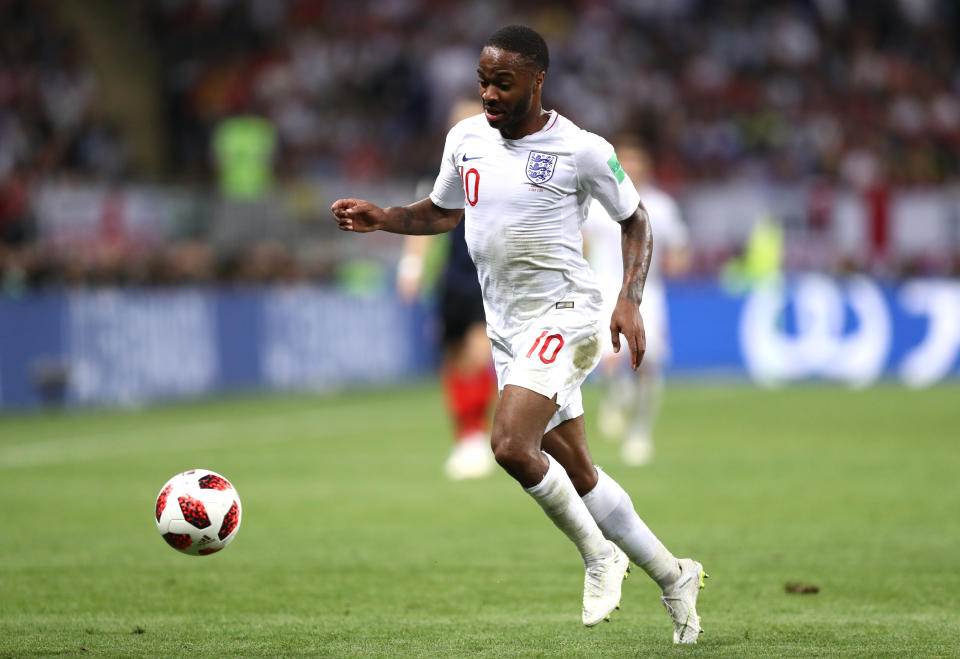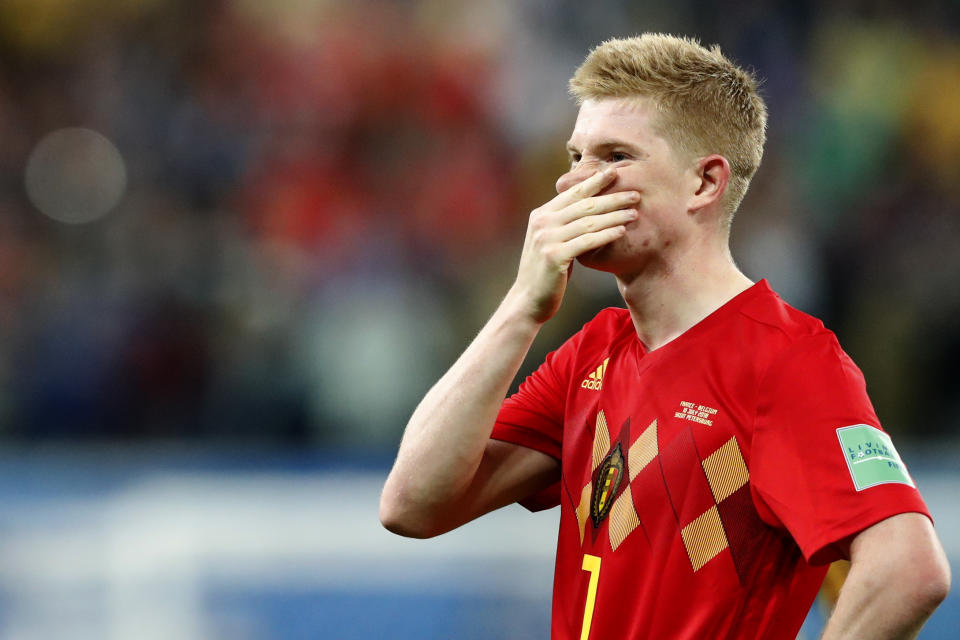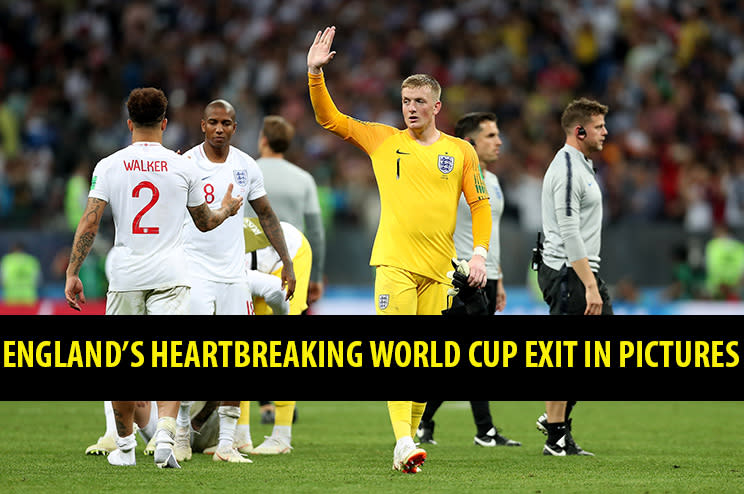Raheem Sterling rose above the haters, racists and media to prove he is one of England's key men

Raheem Sterling’s performances at the World Cup do not justify the level of abuse and criticism that he has attracted.
It is fashionable to do two things regarding Sterling at the moment. One is to criticise him for anything he does, on the pitch or off it. The other is to praise him for all he has done, even at the World Cup. While the motivations of the former are often more unpleasant, there is a truth closer to the middle.
READ MORE: De Bruyne insists ‘wonderful Sterling’ is far more than just about scoring goals
READ MORE: Mahrez tells Maguire ‘you deserve bigger and better than Leicester’
READ MORE: Sterling would be an Exeter player if he didn’t have pace – Jones
First of all, Sterling had a much more impressive season with Manchester City than he did at the World Cup with England. To contrast Sterling in light blue and Sterling in white is to invite disappointment. Like most players, Sterling both looks and plays better when he is surrounded by better players. City have their weaknesses, but their ability in front of goal is not one of them. The focus on attack gives Sterling plenty of chances to pull off something special.
🗣️ ‘If Raheem Sterling didn’t have pace he’d be playing for Exeter’#ENG star’s wastefulness is a ‘worry’ ahead of #World Cup semi-final against #CRO, says Vinnie Joneshttps://t.co/cqCDykjtJ5
— talkSPORT (@talkSPORT) July 9, 2018
Sterling scored 23 goals in 46 appearances for City last season, but failed to find the net in Russia. Sterling provided one assist for England, and 12 for City. It’s a small sample size for one of the groups, but it confirms what seemed to be happening on the pitch. Sterling was much less dangerous for England.
The 23-year-old suffered from poor ratings from the public, but that might not just be because of his on-pitch contributions. He is unpopular with Liverpool fans for leaving the club, is a figure of hate in the tabloids, and suffers from the inveterate racism of much of the English public. As a City player, too, he has a small fanbase to count on in his favour in public votes.
What Sterling can be praised for is using his qualities for the team, even when he was misfiring. At no point did his head drop or his body language display a cause for concern.
His fitness held throughout the tournament, and he never hid from the ball. As he has shown in the face of plenty of criticism from the gutter press, he displays resilience on the pitch and in public.
While he provided only a single converted assist, he did provide six key passes, suggesting that the problem wasn’t a lack of ability to find his man in the final third. With Harry Kane conspicuously misfiring more than we would expect from his performances at Spurs, some of his chances will have been wasted.
Dele Alli is usually a danger in the box, but his muted performances due to a possible injury won’t have helped Sterling pose a threat. Sterling crossed the ball twice all tournament, suggesting a lack of options was the real problem, but we should remember that it would always make more sense to give Kieran Trippier the ball to deliver.
Most chances created for #ENG in the #WorldCup
Kieran Trippier (12)
Harry Maguire (6)
Ashley Young, Raheem Sterling (5)
Dele Alli, Harry Kane, Jamie Vardy, Jesse Lingard, Ruben Loftus-Cheek, Trent Alexander-Arnold (2)— Spurs Stat Man (@SpursStatMan) July 8, 2018
His passing is perhaps where he was weakest. Often featuring as England’s second striker, a pass completion rate of 84% is respectable enough, and dropped to just 80% in the opposition half.
What might have hampered the perception of Sterling is that – and this is harder to measure – many of his passes seemed to be clumped at the legs of a nearby defender, and his runs tended to end simply by running into an opponent. Given England’s opponents sat deep for much of the games – Tunisia, Panama, Belgium and Colombia were all largely on the back foot – there was little room to run into.
He will have experienced that before with City, but with Jesse Lingard his closest teammate, he wasn’t given the assistance to break down a side he would get through Kevin De Bruyne or David Silva. And perceptions are overblown, too.

Before the semi-final, seven of his teammates had given the ball away more than he had (38 times). He was substituted in 80% of his appearances, too, taken off four times by Southgate.
Watching him being withdrawn might lead people to infer he was an inferior player, when most of the time England were preserving him for future matches, or changing the hardest-running players in pursuit of a goal. Given England were only comfortably ahead in one of their games, any attacking mistakes are felt more keenly.
Decided to look at the most productive dribblers at the World Cup after yesterday's festival of take-ons
1/ 🔥 Hazard has absolutely torn it up. This shouldnt even be legal
2/ 🔎 Who's that in 4th? Oh just Raheem Sterling, thanklessly breaking through opposition lines on repeat pic.twitter.com/gtNt4GeZuS
— John Burn-Murdoch (@jburnmurdoch) July 11, 2018
Against Sweden, England’s best performance of the World Cup, credit can be given to Sterling, the most creative player on the pitch. Sterling had 10 more touches in their box than any other England player.
With his attempts to stretch the play, to allow England to threaten with their pace – with Lingard, Kane and Alli breaking down the pitch, Sterling is part of a pack that wins free kicks for the all-important set pieces, having won eight free kicks for his side.
We should not forget how close England were to overpowering Croatia in the first half, with Sterling closer to his best. Had he, Lingard or Kane converted any of their chances then it may have restored any confidence that he was lacking – certainly when the equaliser went in, he suffered with the rest of the side.
I must out it out there, I thought Sterling was terrific tonight and thought he was bought off too early, it’s a positive to admit when you’re wrong, occasionally pic.twitter.com/ChSZpHAtiO
— Ian Abrahams (Moose) (@BroadcastMoose) July 11, 2018
That attitude, of tireless running and a constant threat from deep with his pace, forces sides back. Conceding 10 free kicks of his own, too, from a central position, might show that he was willing to put in a defensive shift when required.
READ MORE: Gareth Southgate set for new deal to lead England to 2022 World Cup
READ MORE: Steven Gerrard praises England for outperforming Golden Generation
READ MORE: Arsenal boss Emery wants five captains and ready for sixth signing
The idea that Sterling had a dreadful World Cup is to miss the point, to look at him in isolation from the context of an England side that had plenty of limitations, certainly ones he is not used to at City.
To suggest that he was crucial to England is, similarly, baffling. He failed to leave his mark on any game bar the quarter-final. He stretched the defence. He kept the ball adequately. Both true, but he is still there to score and create. Sterling didn’t have a bad World Cup, he simply did not stand out as we had hoped.


